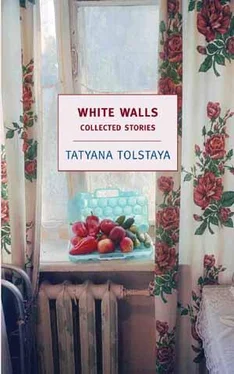The howl of fifteen families shook the earth, the axis shifted, volcanoes erupted, Hurricane Anna wiped out a young underdeveloped nation, the Himalayas grew even taller and the Marianas Trench deeper, but Galya and Yura remained where they were. And the wolves giggled in the forest. For it was written: if you are meant to chirp, don’t purr. If you are meant to purr, don’t chirp.
“Should we denounce the old woman?” Galya said.
“But to whom?” Haggard Yura burned with an evil flame, it was sad to look at him. He figured this and that—no go.
Maybe complain to St. Peter, so that he wouldn’t let the lousy woman into Heaven. Yura picked up a lot of rocks in the quarry and went one night to her house to break her windows, but came back with the news that they were broken—they weren’t the only ones with the bright idea.
Then they cooled off, of course.
Now she lay and thought about Filin: how he folded his fingers into a tent, smiled, dangled his foot, how he raised his eyes to the ceiling when he talked…. There was so much she had to tell him…. Bright light, bright flowers, the bright silvery beard with the black spot around his mouth. Of course, Alisa was no match for him, and she couldn’t appreciate the wonderland. Nor did she deserve it. He needed someone understanding….
“Blah-blah-blah,” said Yura in his sleep.
…Yes, someone understanding and sensitive… to steam his raspberry robe… run his bath… do something with his slippers…
They’d divide their property like this: Yura could have the apartment, the dog, and the furniture. Galya would take their daughter, some of the linens, the iron, and the washing machine. The toaster. The mirror from the hallway. Mother’s good forks. The African violet. That’s all, probably.
No, that’s nonsense. How could you understand Galya’s life, Galya’s third-rate existence, the humiliation, the jabs at her soul? How can you describe it? How can you describe—well, how about the time Galya managed to get—through chicanery, bribery, and the necessary phone calls—a ticket to the Bolshoi—in the orchestra!—just one lousy ticket (of course, Yura wasn’t interested in culture), how she bathed, steamed, and curled herself, preparing for the big event, how she left the house on tiptoe, cherishing the golden atmosphere of the lofty and beautiful in herself—but it was autumn, it started to pour, and she couldn’t get a taxi, and Galya rushed around in the slush, damning the skies, fate, the city builders, and when she finally got to the theater she realized she had left her good shoes at home and her boots were full of mud and the soles had red cakes with clumps of grass sticking out of them—a vulgar bumpkin, a country creep, a local yokel. Even the hem of her dress was messed up.
So Galya—and what was so bad about that?—simply crept to the ladies’ room quietly and washed her boots with her hankie and rinsed off the shameful hem. And then this toad—not an employee, but an art lover—like lilac jelly, her cameos jiggling, started in on her: How dare you! At the Bolshoi, scraping your filthy feet, you’re not in a bathhouse, you know! And she went on and on and people started to stare and whisper and, not knowing what was going on, to give her dirty looks.
And it was ruined for her, spoiled and lost, and Galya wasn’t up to high drama, and the small swans wasted their famous dance at a slow canter. Angry tears boiling, tormented by unavenged injury, Galya flattened the dancers with her gaze without any pleasure, making out through her binoculars their yellowish working faces, their laboring neck muscles, and severely, ruthlessly told herself that they weren’t swans at all but union members, that their lives were like everyone else’s—ingrown toenails, unfaithful husbands—and that as soon as they finished their dance, they would pull on warm knit pants and head for home, for home: in icy Zyuzino, and puddly Korovino, and even to that horrible city limits road where Galya howled silently at night, into that impenetrable misery where you can only run and croak inhumanly. And let’s see that white insouciant fluttery one, that one, take Galya’s daily path, let her fall belly-deep into the tortuous mud, in the viscous Precam-brian of the outskirts, and let’s see her twist and clamber out— now, that would be some fouetté.
How can you describe that?
In March he didn’t call, and in April he didn’t call, and the summer passed in vain, and Galya was going crazy: What was wrong? Was he sick of them? Were they unworthy? She was tired of dreaming, of waiting for the phone call, she began to forget the beloved features: now she pictured him as a giant, frightening black gaze, huge hands with sparkling rings, dry, oriental beard with a metallic rustle.
And she didn’t recognize him right away when he passed her in the subway—small, hurrying, careworn—he went around her without noticing and just walked on, and it was too late to hail him.
He walked like an ordinary man; his small feet, accustomed to polished parquet, spoiled by velvet slippers, stepped on the spittle-covered bathroom tiles of the passageway, ran up the ordinary steps; small fists rummaged in pockets, located a handkerchief, hit his nose— boof, boof! —and back in the pocket; then he shook himself like a dog, adjusted his scarf, and went on, under the archway with faded gold mosaics, past the statue of a partisan patriarch, confusedly spreading his bronze hand with an annoying error in the position of his fingers.
He walked through the crowd, and the crowd, thickening and thinning, rustled, pushed against him—a cheerful overweight woman, an amber Hindu in snow-white Muslim underpants, a soldier with boils, old mountain women in galoshes, stunned by the bustle.
He walked without looking back, he had no time for Galya, her greedy eyes, extended neck—he leaped up like a schoolboy and onto the escalator—and he was gone, vanished, no more, only the warm rubber wind from an approaching train, the hiss and bang of the doors, and the speech of the crowd like the speech of many waters.
And that same evening Allochka called and informed her indignantly that she and Filin went to get married and there, filling out the forms, she discovered he was a pretender, that he was subletting the apartment in the high-rise from some polar explorer, and all those things probably belong to the explorer and not to him, and that he was actually registered as living in the town of Domodedovo. And that she proudly threw the papers at him and left, not because of Domodedovo, of course, but because her pride wouldn’t let her marry a man who had lied to her even this much. And they should know whom they’re dealing with.
So that was it…. And they had associated with him. Why he was no better than they, he was just like them, he was simply pretending, mimicking, that pathetic midget, that clown in a shah’s robe.
Even on the landing she could smell the boiled fish. Galya rang the bell, Filin opened the door and was astonished. He was alone and looked terrible, worse than Julie. Tell him everything. Why stand on ceremony? He was alone and was brazenly eating cod and listening to Brahms, and he had placed a vase with white carnations on the table in front of him.
“Galochka, what a surprise. You haven’t forgotten me…. Please, have some perch Orly, it’s fresh.” Filin offered the cod.
“I know everything,” Galya said and sat down, as is, in her coat. “Alisa told me everything.”
“Yes, Alisa, Alisa, what a treacherous woman. Well, how about the fish?”
“No, thank you. And I know about Domodedovo. And about the polar explorer.”
“Yes, a horrible story,” Filin said sadly. “The man spent three years in the Antarctic and he’d still be there—it’s romantic— and for such a thing to happen to him. But Dr. Ilizarov will be able to help, I’m sure of it. They do that here.”
Читать дальше












